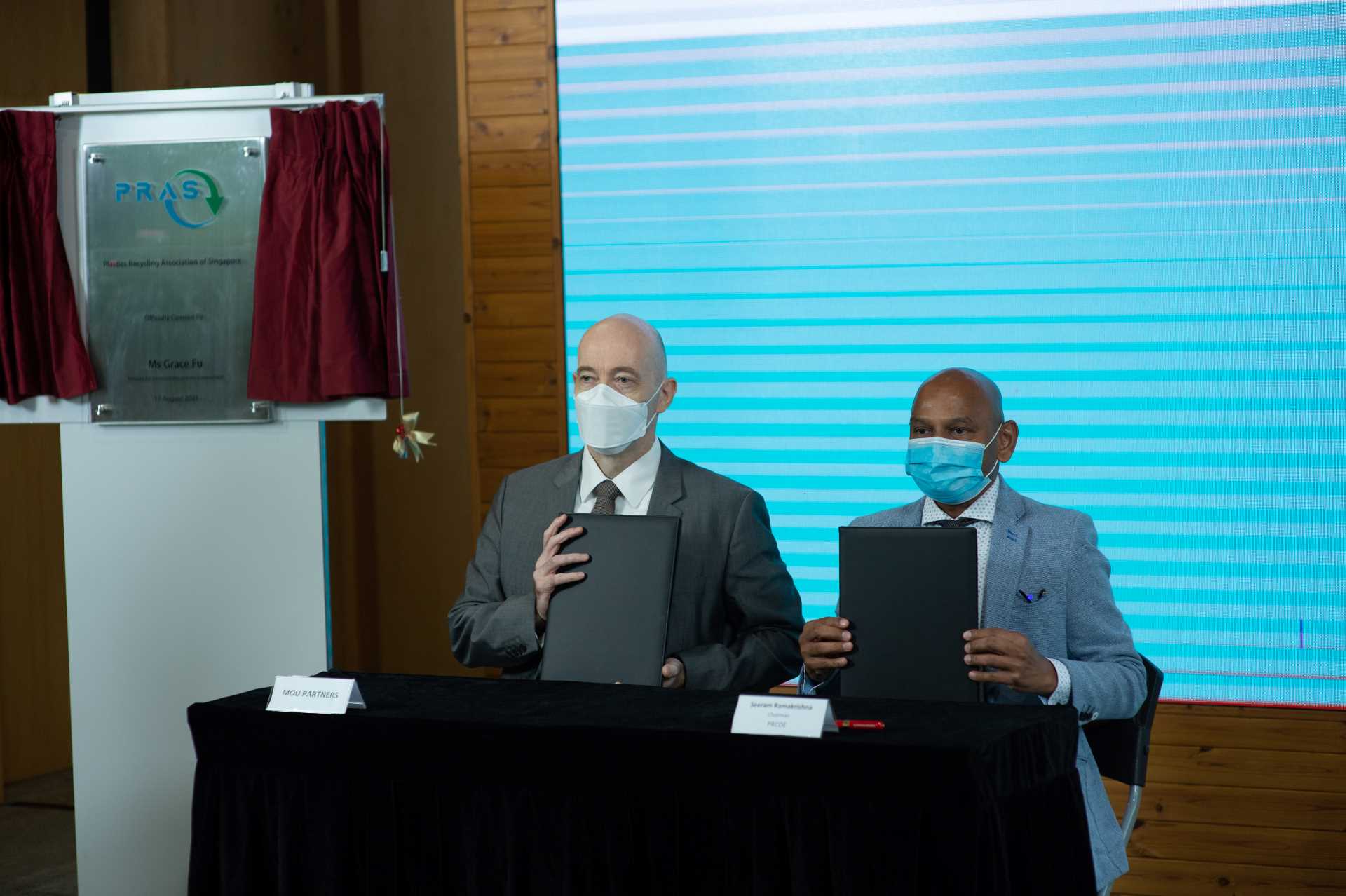
The MOU was signed by Dr. Markus Wächter, Managing Director of TUM Asia and Professor Seeram Ramakrishna, Chairman of PRCOE
A Memorandum of Understanding was signed with the Plastic Recycling Association of Singapore (PRAS) that covers skills training and collaboration in the mechanical recycling of high-volume plastic wastes, the processability of quality recyclate pellets, and the achievement of a higher circularity of plastics.
TUM Asia and TUM support Singapore in its efforts to become a technology pioneer in the field of environmental protection for Southeast Asia
Tuesday, 17 August 2021 – The Technical University of Munich (TUM) Asia signed a Memorandum of Understanding (MOU) with Plastics Recycling Association Singapore (PRAS) to provide skills training and foster closer collaboration in the mechanical recycling of high-volume plastic wastes, the processability of quality recyclate pellets, and the achievement of a higher circularity of plastics.
The MOU was signed by Dr. Markus Wächter, Managing Director of TUM Asia and Professor Seeram Ramakrishna, President of Plastics Recycling Centre of Excellence (PRCOE), amidst the inauguration ceremony of PRAS. The signing was witnessed by Minister Grace Fu, Singapore Ministry of Sustainability and Environment.
Deepening Singapore’s capability in plastics recycling
In this memorandum, TUM Asia and TUM will support Singapore in its efforts to become a technology pioneer in the field of environmental protection for Southeast Asia by deepening Singapore’s capability in plastics recycling.
On the occasion of the signing, Dr. Markus Wächter, Managing Director of TUM Asia, said, “The MOU will make a significant contribution in bridging the skills and knowledge gap needed to accelerate the plastic recycling rate. The partnership will foster closer collaboration between academia and the waste and recycling industry to achieve circular economy goals through developing a skilled workforce.”
Locking away Unwanted Emissions
In Singapore, a lack of recycling ethos coupled with a rise in consumption have driven the recycling rate to a 10-year low of 52 per cent, a decrease from 59 per cent in 2019. With online shopping and home-delivered food gaining dominance during the COVID-19 pandemic, the recycling rate of solid waste has consequently dropped from 17 per cent to 13 per cent[1]. The recycling rate of Plastic was only at 4 per cent[2].
With the use of disposable products growing at an alarming rate, Singapore is facing an impending waste crisis as its one and only landfill is projected to reach capacity by 2035 or earlier.
Singapore has been adopting waste-to-energy initiative to incinerate 79 per cent of its domestic waste in Singapore[3]. Although such a method reduces the amount of waste to 10 per cent while generating useful energy, it releases heat-trapping greenhouse gas into the atmosphere. The low recycling rate of plastics has also come to the fore as one of the biggest environmental challenges in Singapore, given its deeply entrenched throwaway culture contributing to its chronic plastic use and wastage problem.
About TUM Asia:
Technical University of Munich (TUM) was founded in 1868 and is ranked as Germany’s #1 University. Known as one of Europe’s leading technical universities, TUM has strived to create sustainable solutions for society through excellence in education and research. 17 TUM professors and alumni have also been awarded the Nobel Prize since 1927. Through TUM’s unwavering commitment to the betterment of society, TUM Asia was set up in 2002 as the first academic branch campus of any German university. TUM Asia offers Bachelor and Master degrees by TUM, in partnership with universities in Singapore. Additionally, TUM Asia now offers a new suite of Executive Education courses in areas such as Industrie 4.0 and Precision Engineering.
As the first German academic venture abroad, TUM Asia is supported by the Singapore Government through the Economic Development Board (EDB), and by the German Government through the Federal Ministry of Education and Research and the German Academic Exchange Service (DAAD).
[1] https://www.eco-business.com/news/singapores-recycling-rate-falls-to-10-year-low/
[2] https://www.nea.gov.sg/our-services/waste-management/waste-statistics-and-overall-recycling